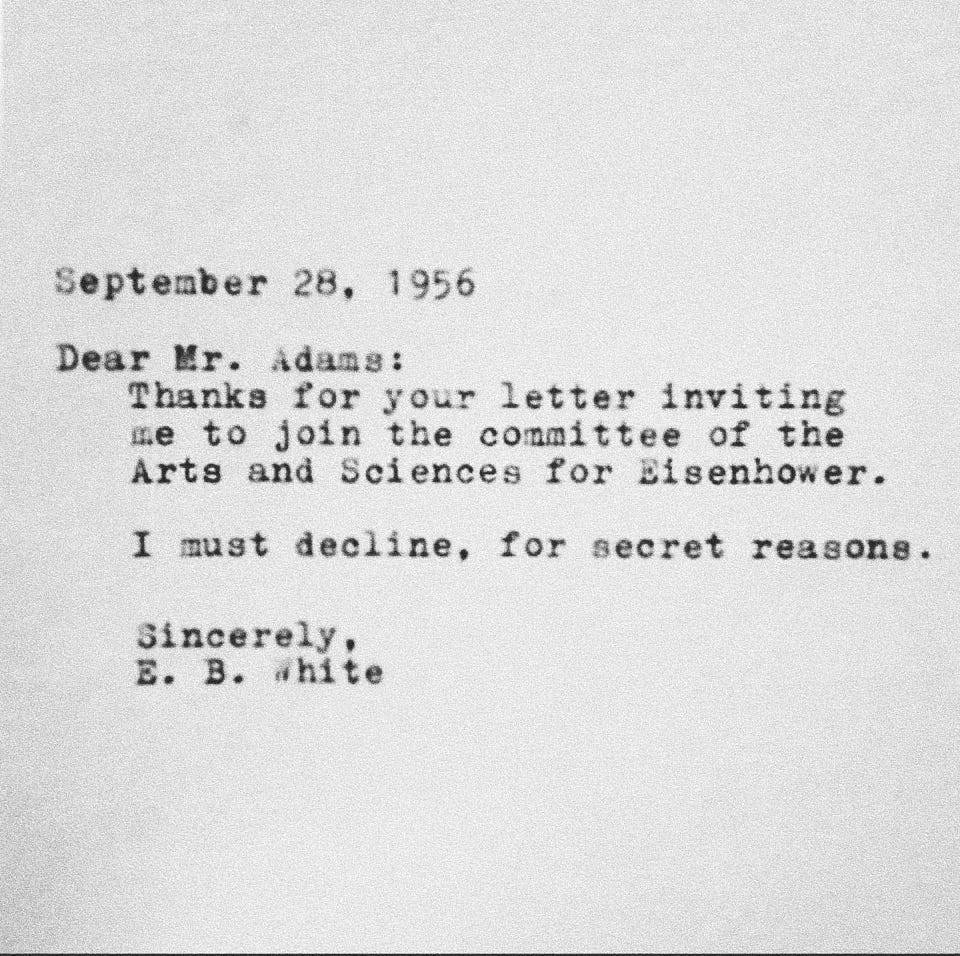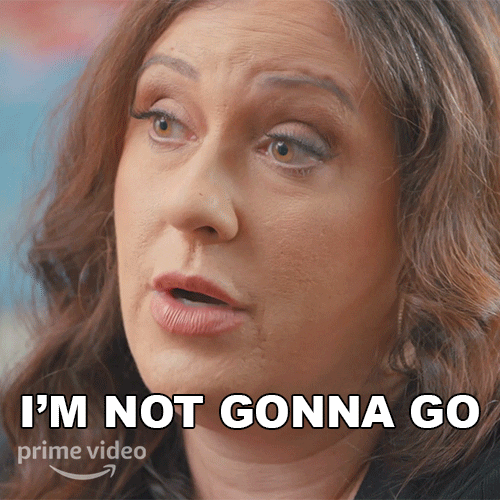How to Decline an Invitation Without Giving a Reason (Politely)
I must decline, for secret reasons.
In 1956, E.B. White (author of “Charlotte’s Web”) received an invitation to join an Eisenhower committee—a prestigious request that would have flattered most writers. His response was legendary in its brevity: “I must decline, for secret reasons.”
White didn’t cite scheduling conflicts. He didn’t manufacture a prior commitment. He simply declined, politely and definitively, preserving both his privacy and his integrity. The phrase “secret reasons” was less evasive than it was elegant—a gentle acknowledgment that some decisions need no explanation.
Most of us aren’t E.B. White, but we can learn from his approach. You don’t need an excuse to decline an invitation. You need only courtesy, clarity, and confidence.
Start Here
You’re not obligated to justify your “no.” Social etiquette requires respect and kindness, not a detailed account of your reasoning. When you manufacture excuses, you:
Risk getting caught in unnecessary lies
Invite negotiations (”What if we move it to Tuesday?”)
Suggest your time is only valuable when you can prove it
Train others to expect explanations for your boundaries
The exception: Close relationships—family, intimate friends, or professional mentors—sometimes warrant more openness. Context matters. But even then, you can be honest without over-explaining.
The Formula: Gratitude + Decline + Period
The most effective declination follows this three-part structure:
Express appreciation (shows you value the gesture)
State your decline clearly (no ambiguity)
End the sentence (resist the urge to elaborate)
That’s it. No “because.” No “unfortunately.” Just polite finality.
Talking Points
For Casual Invitations
Thanks so much for thinking of me, but I’m going to sit this one out.
I truly appreciate the invite, but I’ll have to pass this time.
I really appreciate the offer, but I’ll have to decline. Thank you for considering me!
For Professional Settings
Thank you for the invitation. I won’t be able to attend, but I appreciate you including me.
I’m honored by the invitation, but I’m unable to participate at this time.
I appreciate your thinking of me for this. Unfortunately, I won’t be able to make it.
When You Want Maximum Brevity
No thank you, but I appreciate you thinking of me.
I appreciate your invitation, but I won’t be able to attend.
Unfortunately, I won’t be able to make it this time.
The E.B. White Approach (Advanced Users Only)
I must decline, for personal reasons.
I’m afraid I’ll have to pass, though I’m grateful for the invitation.
Thank you, but I won’t be able to join you.
When Someone Presses for Details
If they ask “Why not?”:
I wish I could share more, but it’s personal. I hope you understand.
I’m just not able to make it work right now.
It’s complicated, but I do appreciate the invitation.
If they suggest alternatives:
That’s kind of you, but my answer is the same. I hope you have a wonderful time.
I appreciate your flexibility, but I really can’t commit to this.
If they seem hurt or offended:
I hope you know this isn’t personal. I simply can’t attend.
I value our [friendship/relationship], which is why I wanted to be honest rather than make up an excuse.
The Etiquette Essentials
DO:
✓ Respond promptly. Delays suggest evasiveness and disrespect the host’s planning needs.
✓ Express genuine gratitude. Acknowledge the gesture, even as you decline it.
✓ Be direct. Clarity is kindness. Ambiguity invites follow-up.
✓ Stay warm in tone. “No” doesn’t have to sound cold.
✓ Suggest an alternative (occasionally). If you genuinely want to connect, propose coffee another time. But only if you mean it.
DON’T:
✗ Fabricate elaborate excuses. You’ll have to remember them, and they may be disproven.
✗ Over-apologize. One “unfortunately” is gracious. Five is groveling.
✗ Leave the door open unless you mean it. “Maybe next time!” implies interest. Be honest.
✗ Ghost. Non-response is the rudest response.
✗ Explain yourself into a corner. The more you say, the more ammunition you give negotiators.
The Psychology of the Reason-Free No
Why does this feel so difficult? Because we’re conditioned to believe that “no” needs justification—that our time is only valuable when we can prove it’s spoken for.
But consider: When you decline with an excuse, you’re essentially saying, “I would attend if not for this obstacle.” You’ve made your attendance conditional rather than decisional. You’ve implied that the invitation itself isn’t the issue—just the timing, or the circumstance, or some external force.
A reason-free decline respects everyone more. It says:
“I’ve considered your invitation thoughtfully.”
“My decision is firm, not negotiable.”
“I trust you to accept my boundary without demanding my private reasoning.”
This is the secret wisdom in E.B. White’s “secret reasons.” He wasn’t being coy. He was being clear.
Special Situations
When it’s a recurring invitation you’ll always decline:
I appreciate you thinking of me for these events, but they’re not really my thing. I hope you’ll understand if I decline future invitations—it’s nothing personal, just a matter of preference.
When it’s from someone you care about deeply:
You know how much I value you, which is why I want to be honest: I can’t make this work. It’s not about the event—it’s just where I’m at right now. I hope you can understand.
When it’s a professional obligation with potential consequences:
Sometimes declining requires more context in work settings. But even then, you can be brief:
Thank you for considering me. Due to current commitments, I won’t be able to participate, but I’m grateful for the opportunity.
Remember
You don’t need permission to say no. You don’t need an airtight alibi. You need only respect—for the person inviting you, and for yourself.
E.B. White knew something we often forget: the most honest answer is sometimes the simplest one. Not because it reveals everything, but because it reveals exactly what needs to be known.
“I must decline.”
That’s enough. It always has been.






